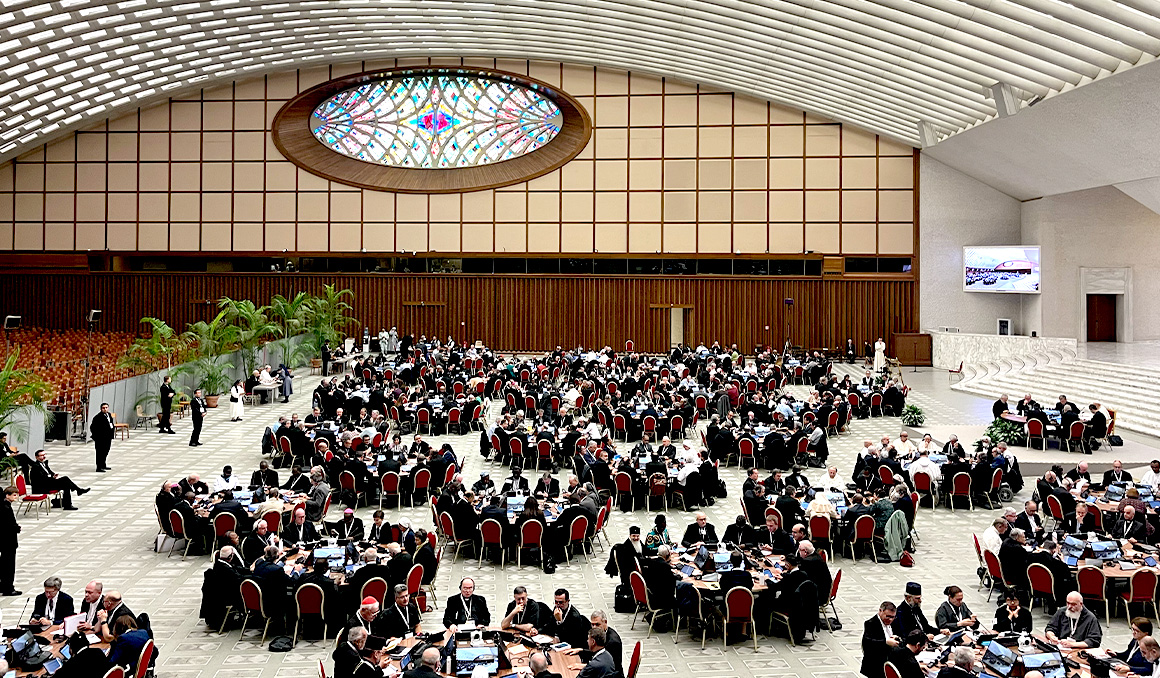CV NEWS FEED // The U.S. Conference of Catholic Bishops (USCCB) has released the National Synthesis for the 2021-2024 Synod, in which a significant number of US Catholics call the Catholic Church to be both a “Safe Harbor” and a place for “Fiery Communion.”
The document was released by the USCCB ahead of the final session of the Synod on Synodality that will take place in October in Rome.
“Participation in this Interim Stage has been an opportunity to deepen our ongoing formation in synodality and in the ecclesiology of the Second Vatican Council,” stated Bishop Daniel Flores, of the diocese of Brownsville, Texas, in a May 28 USCCB news release. “It is with deep gratitude that I share this synthesis which now becomes part of our ongoing record of theological and pastoral reflection together.”
Bishop Flores is also chairman of the USCCB Committee on Doctrine, and a leader for both the USCCB’s participation in the Synod and the synthesis document’s preparation.
The “National Synthesis of the People of God in the United States of America for the Interim Stage of the 2021-2024 Synod” highlights various topics that arose when participants in listening sessions were asked two open-ended questions.
According to the National Synthesis Appendix B, one of the questions posed to participants was: “Where have I seen or experienced successes—and distresses—within the Church’s structure(s)/organization/leadership/life that encourage or hinder the mission?”
Over 1,000 listening sessions took place across the U.S. and over 35,000 people participated in the Working Groups and listening sessions, according to the USCCB news release. Additionally, 76% of all U.S. dioceses and eparchies sent a synthesis report to the U.S. Synod Team, the news release noted.
The Synthesis highlights several topics that were brought up in many of the listening sessions, including Church teaching, liturgy, evangelization, and Catholic Social Teaching.
There were also “two basic hopes for the Church” that became evident from the listening sessions, according to the Synthesis: “the Safe Harbor of certainty and openness and the prophetic mystery at the heart of our Fiery Communion.”
Addressing the topic of the Catholic Church being the “Safe Harbor,” the Synthesis noted: “Parishes with numerous small faith communities, bible studies, and prayer groups prove most successful in welcoming and integrating people from diverse backgrounds.” Participants also expressed an appreciation for Catholic education and the important role Catholic schools have in evangelization.
“At the same time, the Church is called not only to be a place of safety, but also a Fiery Communion that witnesses to the Gospel with prophetic zeal,” the Synthesis read.
“Participants in synodal listening sessions acknowledged that the synodal process has unearthed tensions within our communion,” the Synthesis continued, noting that some tensions and concerns arose around topics such as “how the Church responds to LGBTQ and other marginalized people,” reverence in the Church, and how Church teaching should be more clearly presented by Church leaders.
“While this Fiery Communion can sound discordant, the ardent nature of our diverse communion in Christ is not outside of the tradition,” the Synthesis added:
These tensions call for a prophetic response, sustained by the Safe Harbor and embracing the Fiery Communion… As the People of God recognize this synodal moment, the Safe Harbor provided by and in the Church allows us prophetically to embrace the tensions of the Fiery Communion.
Many participants expressed a desire for Church teaching to be presented more clearly by Church leaders.
The Synthesis highlighted a quote from Region III that said some participants “were challenged by the Church’s ‘indecisiveness,’ by ‘lack of reverence,’ and by the perception that the Church is ‘changing the traditional methods’ and accepting current ‘things against our church rules.’”
“One area that participants concretely experienced stress was in situations relating to the liturgy,” the Synthesis later noted. Participants also expressed a desire for Catholic Social Teaching to be prioritized more.
The Synthesis also includes a section on the Bishops’ Listening Session. This section noted that the bishops discussed topics such as handling political polarization within the culture and theological polarization. The bishops also expressed an appreciation for spiritual retreats and USCCB meetings that build the fraternal relationships between them.
“Also, it was observed that bishops in the United States need to look for ways to strengthen relations with bishops in Canada and Mexico,” the Synthesis read.
In the news release, Bishop Flores stated, “This document reflects the sense that there exists among Catholics in the United States a deep desire to rebuild and strengthen our communion as the Body of Christ.”
“Rebuilding trust where it is frayed involves practicing the humanly graceful art of listening to each other and speaking together. The more we do this, the more we realize that it is the Lord who never fails us,” he concluded.
The English PDF file of the “National Synthesis of the People of God in the United States of America for the Interim Stage of the 2021-2024 Synod” can be accessed here.
